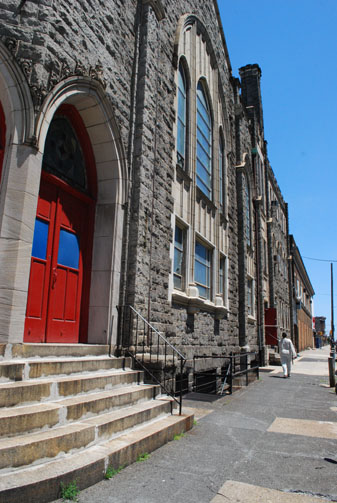
At 1:25 p.m. Sunday, just five minutes before Zion Cares Ministry services were scheduled to begin, the Rev. Margie Brown still stood in her apron, hugging and greeting the ivory- or white-clad members of the 11-person choir as they slowly filed in from across the street.

Each Sunday, the Zion Cares ministry program offers a 1:30 p.m. church service, a mid-afternoon meal and clothing items to Nicetown-Tioga community members in need.
Zion Cares operates under the Zion Community Center, Inc., and is just one outreach-ministry venture by the Zion Baptist Church at 3600 N. Broad St. The weekly services take place inside the Zion Educational Annex, located at Broad and Venango streets, just across the street from Zion Baptist.
Brown, the chairperson of Zion Cares, refers to visitors as, “the whosoever will.”
“We don’t know who’s going to walk through those doors, and we don’t know what condition or situation they will be in when they do … but we do greet them with love,” she said.
This past week, female choir members from Zion Baptist led a special Zion Cares service, filling the worship space with song. Four of the women, who were once in need themselves, came through Zion Cares as attendees at one time, four-year Zion Cares leader Shango-Jamal Lewis said.
When Lewis first began working with the ministry, he had no idea he would become so involved. Lewis, who grew up in Nicetown-Tioga, said he “was just supposed to be the cat who was there in the background,” but soon found himself leading the program’s weekly services.
Lewis said that when he first started, “the strength of worship there was not what it could be,” and admits that, “even now, it could be taken to another level.”
But Lewis’ mother, Sylvia Satterwhite, said the ministry is one, “that is really needed in this community.”
Satterwhite, who has been regularly volunteering her Sunday afternoons to Zion Cares, first volunteered after her son asked her to help serve food with him in December 2006.
Satterwhite said she’s been coming to help every Sunday since.
“It was like family,” she said.
Since Lewis and Satterwhite first started volunteering, they’ve seen regular attendees develop friendships not only among themselves, but with the volunteers as well. The pair has also seen certain attendees take on particular roles every week, such as one woman who reads Psalm 23 each Sunday.

Those roles, Lewis said, help remind visitors they “can make a difference.”
“You see that growth – you see that they sort of get that pride about themselves. And you can see it every Sunday when they come,” Satterwhite added.
One male visitor, an unofficial greeter of sorts, sat inside the door during the services this past Sunday and welcomed others as they entered, repeating a simple message: “One day at a time.”
“It makes me appreciate everything that I have,” Satterwhite said. “You know, we take things for granted … until you see someone who has nothing but that hope of getting from where they are to a better place.”
What Zion Cares does for local residents, Lewis said, is help them participate more actively in their community. He said many community members come from a mentality of, “the neighborhood just being a ‘hood,’” but he and the volunteers try to “get them back into the mindset of community.
“You have to take the label off of the ministry and get people to understand that these people are your brothers and your sisters,” Lewis said. “You’re not doing it for the condition. You’re doing it for the person … and therefore, it could be yourself [experiencing similar circumstances] at any time.”
“Not everybody who comes to Zion Cares is homeless. Not everybody who comes to Zion Cares is coming from addiction,” he added.

Lewis stressed that the program is about more than just feeding the homeless – it’s about demonstrating to community members, “the benefits of faith, what they can invest in themselves,” a message that echoes the mission of the Rev. Leo H. Sullivan, who was largely responsible for growth of the church during the 1950s and ‘60s.
And although Zion Baptist’s roots date back to the late 19th century, when its founder, the Rev. Horace B. Wayland started a small prayer group, it wasn’t until 1950, when Sullivan moved the church to its current location at Broad and Venango streets, that Zion Baptist started making a name for itself.
Sullivan, who also founded North Central Philadelphia’s recently renovated Progress Plaza, was able to transform the church’s 600-person membership into a 6,000-person one. The civil rights leader was known for his belief in “self help” and encouraged individuals to become active participants in their communities.
“Some people are just trying to go back and make it about the community,” Lewis said, “as a beacon for the people who are already there.”


Be the first to comment